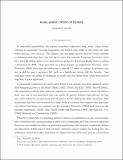Bargaining with Optimism
Author(s)
Yildiz, Muhamet
Downloadhetero-B.pdf (327.3Kb)
OPEN_ACCESS_POLICY
Open Access Policy
Creative Commons Attribution-Noncommercial-Share Alike
Terms of use
Metadata
Show full item recordAbstract
Excessive optimism is a prominent explanation for bargaining delays. Recent results demonstrate that optimism plays a subtle role in bargaining, and its careful analysis may shed valuable insights into negotiation behavior. This article reviews some of these results, focusing on the following findings. First, when there is a nearby deadline, optimistic players delay the agreement to the last period before the deadline, replicating a broad empirical regularity known as the deadline effect. Second, there cannot be a substantial delay under persistent optimism; i.e., excessive optimism alone cannot explain delays. Third, when optimistic players are expected to learn during the negotiation, they delay the agreement in order to persuade their opponents. The delays in these results can be quite costly, Pareto inefficient, and common knowledge at the beginning of the game.
Date issued
2011-05Department
Massachusetts Institute of Technology. Department of EconomicsJournal
Annual Review of Economics
Publisher
Annual Reviews
Citation
Yildiz, Muhamet. “Bargaining with Optimism.” Annual Review of Economics 3.1 (2011): 451–478. Web.
Version: Author's final manuscript
ISSN
1941-1383
1941-1391